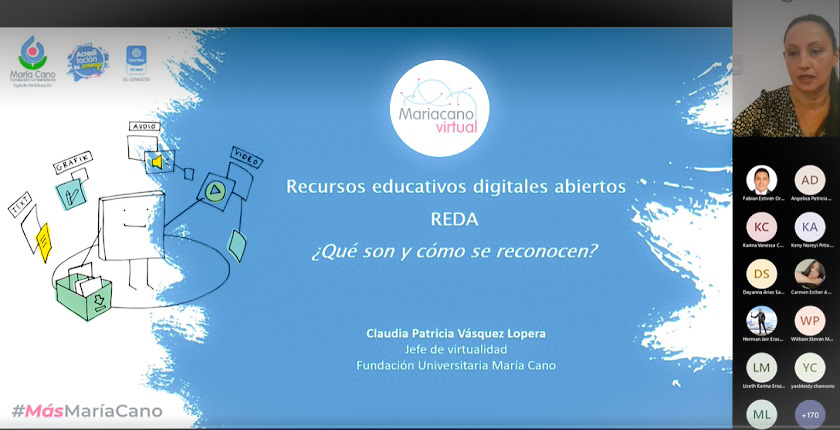Blog
Conference «Open Digital Educational Resources – REDA»
- 28 octubre, 2021

Within the framework of the Proyéctate conference held at the Popayán headquarters, the head of virtuality Claudia Patricia Vásquez Lopera, was invited to the opening conference on October 28, in which the topic of Open Digital Educational Resources REDA What are and how are they recognized?
This space had the participation of more than 250, teachers, students and administrative staff. The Project Day socializes classroom projects, successful experiences in Physiotherapy practice and holds the internal meeting of Research Seedbeds. Some of the results of this academic exercise are digital educational resources or contain digital educational resources. Therefore, this conference intended that the participants, teachers, students and administrators, strengthen ICT skills in the recognition of Digital Educational Resources on the Web for academic use and ethical responsibility in the use of resources that have Creative Commons licenses. , avoiding the use of digital resources with reserved rights (Copyright), which for the most part do not allow the use, disclosure or reproduction of part or all of the published content.
At the beginning of the presentation, a diagnostic survey on the subject was carried out in which more than 100 people participated. Within the results we have that:
- 79% of the participants do not know the Open Digital Educational Resources
- 58% do not know what copyright or reserved rights are
- 85% have not heard of Creative Commons use licenses
- 92% have not used digital educational resources with Creative Commons licenses
This indicates that the academic space was relevant and the participants had the opportunity to learn a little about the subject, to recognize the importance of using these types of resources and to continue strengthening their ICT skills.
In the virtuality guidelines of María Cano, the use licenses for the Digital Educational Resources produced by Mariacanovirtual or by the teachers are specified, through the Creative Commons licenses of attribution, non-commercial and without derivation. What makes our Digital Educational Resources Open and can be used by anyone in the institution or outside of it, taking into account the specifications indicated in the CC licenses. We hope to continue strengthening this contribution to the information and knowledge society and that events like this will help students join the creation of their own digital resources with this type of license.
#MásMaríaCano
